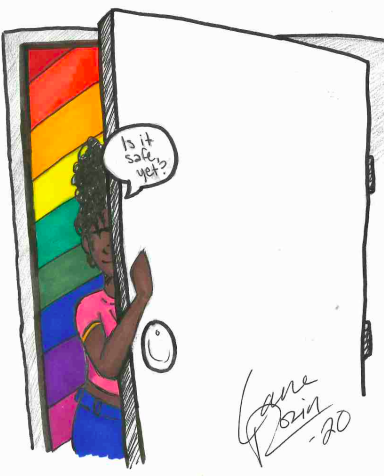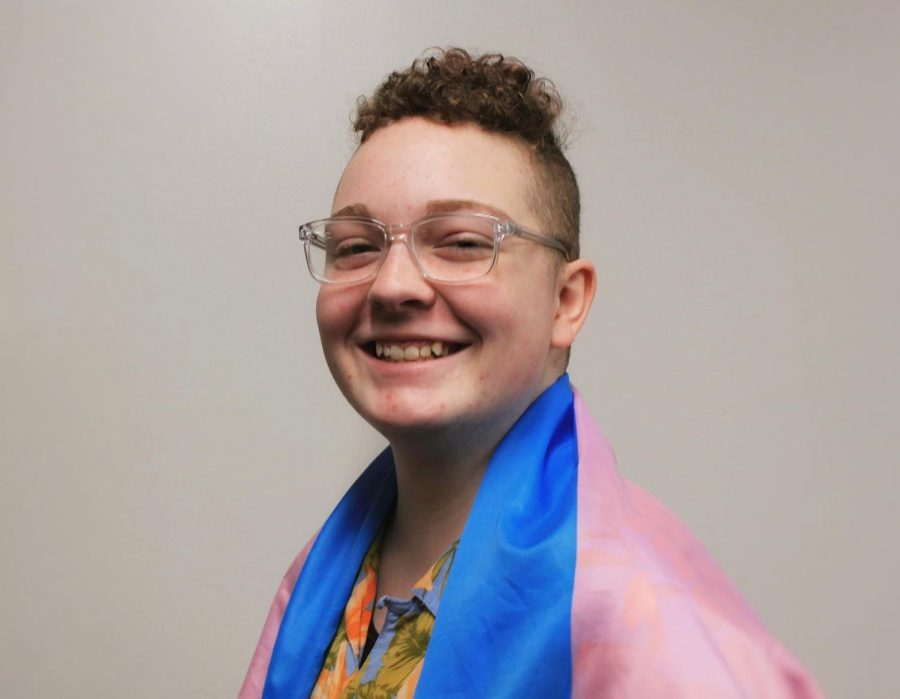
Photo by: Lane Phifer
In the article “The Experience of Coming Out for LBGT+ Individuals,” 47 percent of the people surveyed claim to remain in the closet due to familial tension, 37 percent fear how society will treat them, and 23 percent feel unsafe due to the violent crimes committed each year against queer people.
Coming out: an inside look at what it’s like to be in/out of the closet
The struggles of being in the closet
As sophomore Meagan Wood comes home from school, she quickly runs up to her room, plugs in her headphones, and writes “I’m gay” repeatedly in her journal. While she’s built up the courage to say this sentence a million times to her friends, she’s never been able to say it to her parents.
For Wood, keeping her sexuality a secret to her family can be a burden. The house in which she lives in feels like less of a home with each day, however, she’s not the only one that feels this way.
The students that are featured in this article have requested to remain anonymous due to the sensitivity and privacy of the subject.
When Wood was in eighth grade, she knew that she wasn’t your typical girl—she was a lesbian. This realization then leads to coming out to close friends once freshman year rolled around.
While being out to her friends felt natural, when it came down to her parents that was a different story.
“I can be an open book when I want to, but growing up being one to my parents has never really been something I was,” Wood said. “I know my parents wouldn’t try to change my mind, but I think that me being in the closet gives my Mom this feeling of security that I’ll marry a man and have kids.”
In the article “The Experience of Coming Out for LBGT+ Individuals,” 47 percent of the people surveyed claim to remain in the closet due to familial tension, 37 percent fear how society will treat them, and 23 percent feel unsafe due to the violent crimes committed each year against queer people.
For students like sophomore Owen Adams, a female to male trans man, not being able to come outputs a toll on his mental health.
“After I attempted to come out, my mental health worsened,” Adams said. “I feel like I’m always living this double life that I’m always trying my best to keep as separate as possible, but it just keeps getting harder with every time I write my dead name on my school assignments.”
While many of Adams’ friends were able to come out into an accepting household, Adams’ was not. Having to hide who he is an everyday battle fought at home and school.
“Being closeted at school is a heavier burden than the backpack I carry to and from school every day, and my bag probably weighs half of what I do,” Adams said. “Being closeted at home, no matter if I’m with my mother or my father, feels like I’ve been put in a room with spikes overall uncovered surfaces; I never feel safe.”
After dealing with rejection from his family, Adams decided to use social media as an outlet by being apart of support groups for trans men like himself.
According to the article, “The ABCs Of Identifying as an LGBTQ Youth,” 73 percent of those surveyed say they are more honest about themselves online.
“Because of the fact that I knew that I wouldn’t get the support needed from my family, I joined a support group,” Adams said. “It made me feel more accepted and supported.”
Strong family bonds, safe schools and support from loved ones can protect LGBTQ youth from depression and suicidal thoughts or actions according to the article, “Mental health and the LGBTQ Community.”
While coming out can be challenging since four out of 10 individuals aren’t accepted by their family, Wood claims that it’s also something that shouldn’t have to be told, but rather easily accepted.
“I think my biggest fear is my parents finding out from somebody who isn’t me, which is why I’ve always wanted to tell them, but I don’t feel like it’s something that needs to be told,” Wood said. “I should be able to bring somebody home and tell my parents that I love that person and they accept me with open arms.”
If you or someone you know has suicidal thoughts or actions, please contact the Trevor Project call center.
1-866-488-7386




